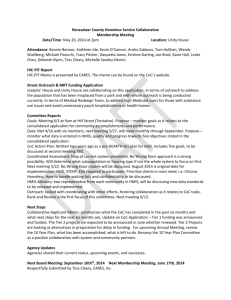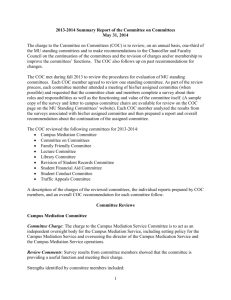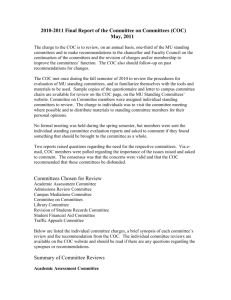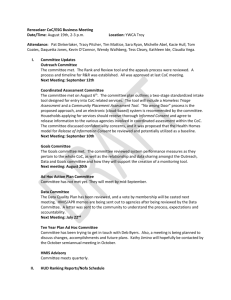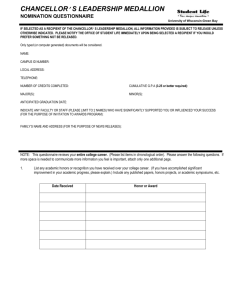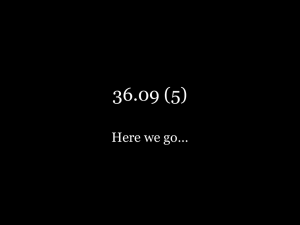Committee on Committees Annual Report 2012-2013
advertisement
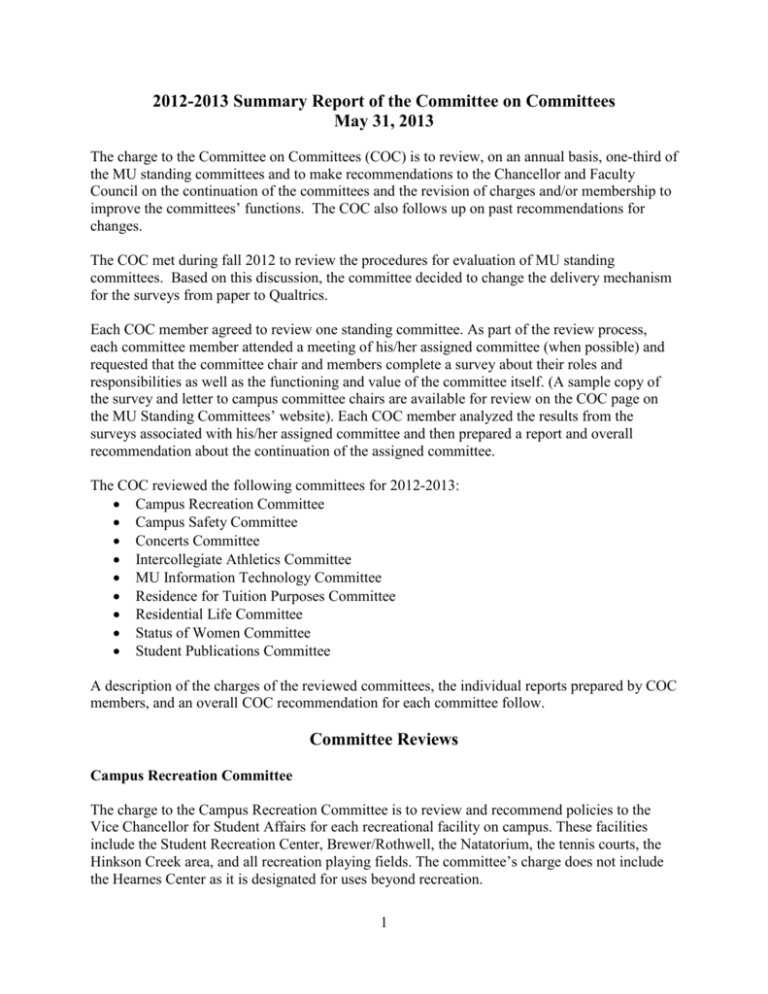
2012-2013 Summary Report of the Committee on Committees May 31, 2013 The charge to the Committee on Committees (COC) is to review, on an annual basis, one-third of the MU standing committees and to make recommendations to the Chancellor and Faculty Council on the continuation of the committees and the revision of charges and/or membership to improve the committees’ functions. The COC also follows up on past recommendations for changes. The COC met during fall 2012 to review the procedures for evaluation of MU standing committees. Based on this discussion, the committee decided to change the delivery mechanism for the surveys from paper to Qualtrics. Each COC member agreed to review one standing committee. As part of the review process, each committee member attended a meeting of his/her assigned committee (when possible) and requested that the committee chair and members complete a survey about their roles and responsibilities as well as the functioning and value of the committee itself. (A sample copy of the survey and letter to campus committee chairs are available for review on the COC page on the MU Standing Committees’ website). Each COC member analyzed the results from the surveys associated with his/her assigned committee and then prepared a report and overall recommendation about the continuation of the assigned committee. The COC reviewed the following committees for 2012-2013: Campus Recreation Committee Campus Safety Committee Concerts Committee Intercollegiate Athletics Committee MU Information Technology Committee Residence for Tuition Purposes Committee Residential Life Committee Status of Women Committee Student Publications Committee A description of the charges of the reviewed committees, the individual reports prepared by COC members, and an overall COC recommendation for each committee follow. Committee Reviews Campus Recreation Committee The charge to the Campus Recreation Committee is to review and recommend policies to the Vice Chancellor for Student Affairs for each recreational facility on campus. These facilities include the Student Recreation Center, Brewer/Rothwell, the Natatorium, the tennis courts, the Hinkson Creek area, and all recreation playing fields. The committee’s charge does not include the Hearnes Center as it is designated for uses beyond recreation. 1 The Campus Recreation Committee meets twice a year. The COC committee member was not able to attend a meeting. The committee chair and three committee members responded to the survey. There appeared to be a desire for students to be able to provide more input and feedback to the Director of Recreation Services and Facilities, whether through a student survey or more informally through more frequent meetings. The COC recommends continuation of this committee. Campus Safety Committee The charge of the Campus Safety Committee is to recommend policies and procedures related to the safety and elimination of campus hazards to the Vice Chancellor for Administrative Services. The Campus Safety Committee members displayed a strong commitment to their charge and have a great deal of expertise and knowledge of safety issues and procedures. The committee reviews reports from offices most involved in campus safety which include safety incidents, safety reports, and plans for improvement. Overall, the committee functions well. Based on a review of the survey responses, some committee members suggested that the responsibilities associated with the charge of this committee require more than two meetings a year. Some also requested a clear designation of responsibilities and assignments for individual committee members. The COC recommends continuation of this committee. Concerts Committee The charge to the Concerts Committee is to make recommendations to the Provost and the director of the Concert Series concerning the continued improvement of the Concert Series. The Concert Committee usually meets monthly to discuss the concerts and the associated costs, the marketing for these concerts, as well as how well they sell. They share thoughts with the Concerts staff. In the spring, they discuss the concerts signed for the following year. There are no subcommittees. The reviewer was scheduled to attend the February 22, 2013 meeting; however, campus was closed on that day due to a snowstorm. As a result, the chair of the committee forwarded the information about completing the survey to the committee members. Six members completed the survey. Survey results from committee members demonstrated that the committee provides a useful function. The committee members understand the committee’s charge, agree that the committee is fulfilling its responsibilities, and conclude there is no need to change the committee’s functioning. The responses to the questionnaire were positive and appreciative of the work and function of the Concerts Committee. Members indicated that it is an enjoyable committee. They identified several strengths including (a) the participation rate (the Committee Chair also reported almost 2 perfect attendance), (b) productive conversations with the administration, (c) civility, and (d) the diversity of the members (i.e., their wide diversity of age, interests, knowledge, and expertise). Committee members also value the inclusion of members of the Columbia community within the group of faculty members, staff, and students. In terms of improving processes, one member expressed a preference for fewer meetings and a second member indicated that it was not always clear if the advice that the committee presented was implemented. Therefore, the staff may want to consider reporting back to the committee how their input was utilized. The COC recommends continuation of this committee. Intercollegiate Athletics Committee The charge to the Intercollegiate Athletics Committee (IAC) is to advise the Chancellor and to consult with the Director of the Intercollegiate Athletics in all matters relating to Intercollegiate Athletics at MU. Committee recommendations to the Chancellor are made in accordance with the policies of the Board of Curators, the University, and the applicable rules and regulations of any regional or national conference or association. The IAC is an active committee that is responsible for issuing a full report on academic performance, budgets, diversity initiatives, the total person program, and other athletic-academic issues every three years. The IAC uses a sub-committee structure to accomplish these tasks. IAC members reported having an excellent relationship with MU Athletic Department personnel, indicating that the transparency of the Athletic Department greatly aided the IAC in accomplishing its charge. IAC members reported that one more meeting (on an annual basis) would benefit the committee. The COC recommends continuation of this committee. MU Information Technology Committee The charge to the MU Information Technology Committee is to advise the Chancellor, Provost and Faculty Council on issues involving computer and information technology through oversight of those entities responsible for computer and IT services on the MU Campus. The committee meets monthly but not on a set day or week of the month. The results from the survey were mixed. Committee members indicated the following on the survey. Most members felt the committee makes constructive use of their time, conflicts, and criticism to produce good results. Regular attendance was problematic and it was sometimes difficult to achieve a quorum at each meeting. Some members do not feel as connected to the committee as others. Some feel the work is not spread equitably among members. The committee was mixed on their understanding of the committee charge and mission. Some feel the committee only approves a budget. 3 Many felt that GeJuan Cochran and Kevin Bailey provide good support to the committee. Some suggested that committee notes should be public. There is no other communication to the Chancellor, Provost and Faculty Council during the year except for budget approval. Communication to that group on IT issues is part of the mission and should be prioritized. We present several recommendations based on the feedback from committee members. First, the committee should include members who are committed to the charge, but also have the availability to attend meetings. Second, the charge and mission of the committee may need to be modified (if appropriate) and clarified for committee members. For example, some members thought the committee’s role was to give a “thumbs up or down” to the budget while others felt it is to guard student-generated IT funds including awarding grants to technology projects. Still others said it was to provide strategic direction for technologies and advising the Chancellor, Provost and Faculty Council. Regardless of the interpretation, some felt the mission was not being implemented or communicated. These two issues should be addressed during the next year. The COC recommends continuation of this committee. Residence for Tuition Purposes Committee The charge to the Committee on Residence for Tuition Purposes is to act on cases referred by the Registrar or Cashier, or appealed by a student, with respect to liability for tuition customarily charged a nonresident of the state. The Committee on Residence for Tuition Purposes hears and votes on matters pertaining to questions of student residency, for in-state or out-of-state tuition purposes. Recommendations are made on resident status for tuition purposes only and have no bearing on matters of admission. The COC committee member was not able to attend a meeting. The committee chair and two committee members responded to the survey. The committee chair spoke very positively about the active participation and open dialogue of the committee. He felt that one of the strengths of the committee was the fact that everyone had a voice and everyone has an equal vote. The committee members were pleased with the representation from different areas of campus, but expressed concerns about the timing of meetings. There was concern about irregularity of student attendance. Overall, it seems that this committee does a good job of welcoming diverse and open discussion, but needs to address the scheduling and attendance issues. The COC recommends continuation of this committee. Residential Life Committee The charge of the Residential Life Committee is to make recommendations to the Vice Chancellor for Student Affairs for the enhancement and promotion of student learning. It also serves to advise the Vice Chancellor on programs, services, and policies regarding the residence halls and other University-recognized residences. 4 Ten committee members responded to the survey. The committee communicated that it is confident in the programs facilitated by Residential Life. Members who completed the survey felt the committee was effectively completing its charge. However, they did identify a couple of concerns. First, many members were concerned that their individual duties were unclear and they needed more direction. Second, the committee met infrequently; committee members recommended scheduling more meetings to accomplish the charge. The COC recommends continuation of this committee. Status of Women Committee . The Chancellor’s Standing Committee on the Status of Women works to create an environment of equity, fairness, and justice for all women on campus—including all students, faculty and staff—respecting the diversity of women’s experiences. They investigate the status of women at the University of Missouri and make policy recommendations to the Chancellor. They promote the advancement of women through education, communication, advocacy, support and activism. The Status of Women Committee meets once a month to tackle important issues. The committee functions well and is meeting its charge. One strength of the committee is its diverse membership that is eager to participate in the decision-making process. The committee hosts forums for female faculty, staff and students to learn about their concerns. They work with the Women’s and Gender Studies Department to coordinate activities recognizing women on campus. The committee regularly seeks input related to the needs and concerns of women. They have successfully gathered enough response to publish a flyer titled, “Taking the Pulse.” The COC recommends continuation of this committee. Student Publications Committee The charge to the Student Publications Committee is to recommend to the Vice Chancellor for Student Affairs policies and regulations regarding the publication of the Maneater and Savitar. This committee only meets if there is an issue. Therefore, the COC member did not attend a meeting. The survey was completed by 6 members of the Student Publications Committee. Most members felt that the Student Publications Committee was necessary. However, they identified a couple of concerns. They recommended additional structure including meetings. For example, one committee member mentioned that the increased use of social media might necessitate more frequent meetings. There was an issue with the April Fools Issue of the Maneater and the committee met to advise the editorial staff on how to deal with it. There were several comments suggesting that the Committee should meet at least once per year to be proactive and try to avoid issues like this in the future. Overall, the committee members think that a tighter structure would help the committee function more effectively. The COC recommends continuation of this committee. 5
